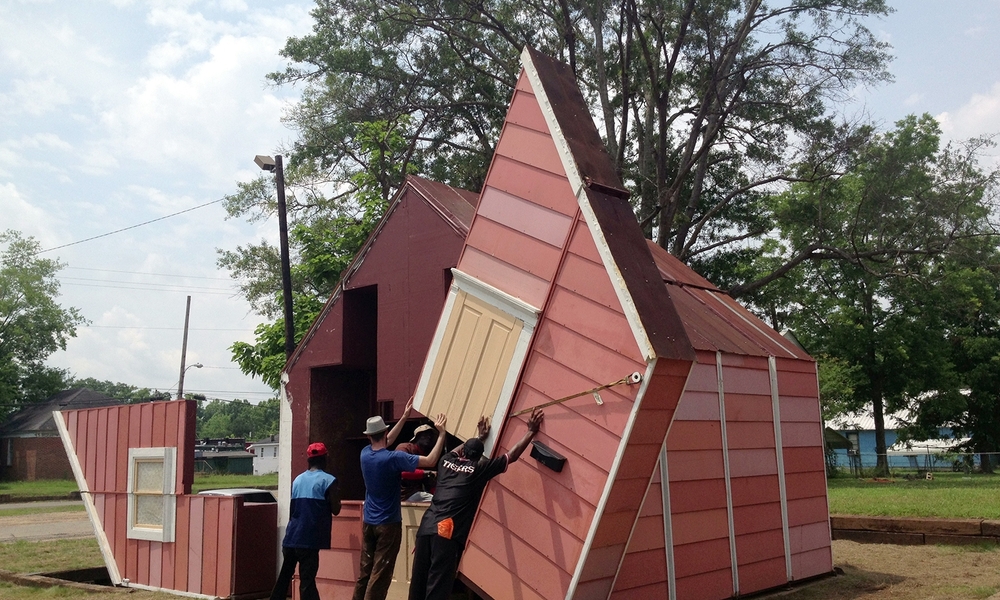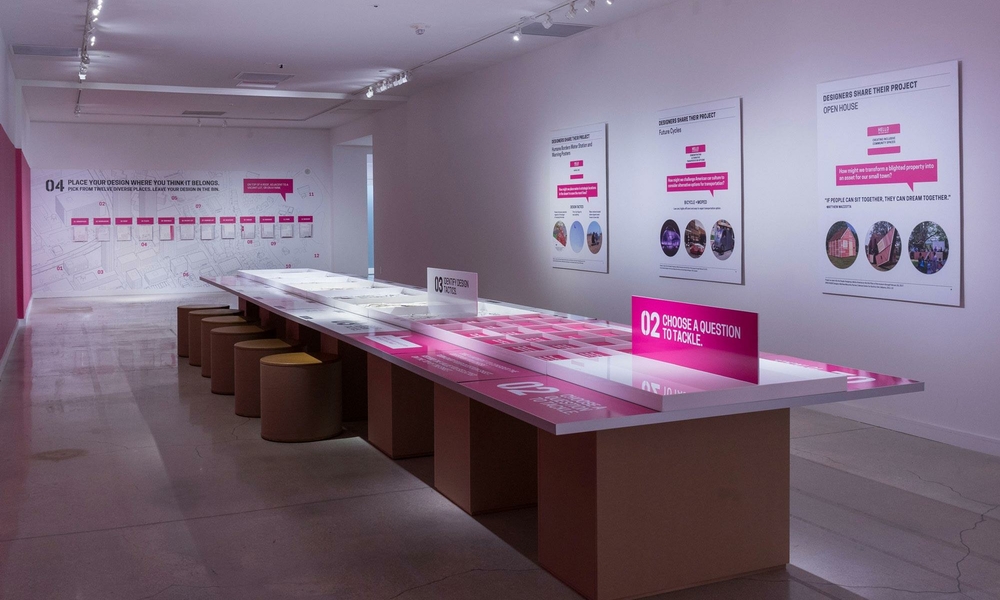By the People
Public Programs
By the People: Designing a Better America
Public Programs
By the People: Designing a Better America, a major exhibition on socially responsible design, features sixty design projects from every region across the U.S. and explores the challenges faced by urban, suburban, and rural communities in the U.S. and its bordering countries.
The public programs for By the People include four roundtables with leading architects, urban activists, and artists, and considers how design and architecture can spearhead “a new civic imagination.” These programs seek to engage audiences with issues critical to a more equitable urban future. Architects, designers, planners, activists, sociologists, anthropologists, and political leaders from across the Americas participate in dialogues with their Miami-based peers.
The public programs of By the People: Building a Better America are curated by Dr. Ariadna Hernandez-Reguant, Research Assistant Professor at Tulane University and urban anthropologist with extensive research experience on Miami’s urban communities and civic practices.
By the People: Designing a Better America is organized by Cooper Hewitt, Smithsonian Design Museum, and curated by Cynthia E. Smith. The presentation of this exhibition at the Museum of Art and Design at MDC is organized by MOAD’s Senior Curator, Wanda Texon. By the People: Designing a Better America is made possible by the generous support of the Miami-Dade County Department of Cultural Affairs and the Cultural Affairs Council, the Miami-Dade County Mayor and Board of County Commissioners; and by the State of Florida, Department of State, Division of Cultural Affairs and the Florida Council on Arts and Culture.
The full schedule of programs is as follows:
May 30, 2018, 7:00 PM
“Creative Placemaking: What’s in It for Miami?”
Roundtable
Recently, “placemaking” has become a buzzword among policy makers, foundations, and community activists. As public institutions reduce their involvement in the arts, culture, and education, private stakeholders have stepped in to address communities’ needs for inclusive public spaces. These spaces, ranging from small children’s playgrounds to entire arts districts, are ideally conceived in dialogue among communities, public policy agents, interested businesses and non-profits, and others. This panel discusses how to activate “creative placemaking” initiatives, and how to balance communities’ mobilization (or lack thereof), the top-down approaches of policy-makers, and the profit drives of urban developers. Panelists include Courtney Spearman (National Endowment for the Arts), Victoria Rogers (Knight Foundation), Dr. Ann Markusen (University of Minnesota), and Roberto Rovira (FIU), moderated by Dr. Ariana Hernandez-Reguant (MOAD/Tulane University).
June 15, 2018, 7:00 PM
“Race and Urban Space: Overcoming Inequality in Miami”
Roundtable
What can architecture and urban planning do to mitigate racial inequality? Do we still believe that residential racial integration is the solution? Miami’s lines of racial segregation have barely moved since the time of the Civil Rights movement, as incoming immigrants settled in neighborhoods according to preexisting demographics. As much of the African American middle class, just like its white counterpart, fled to the suburbs in the last decades of the twentieth century, and as urban policies crafted in the aftermath of the 1968 Fair Housing Act were increasingly defunded and abandoned, black neighborhoods experienced a decline. How can new “placemaking” initiatives, largely spearheaded by communities and the non-profit sector, contribute to overcoming segregation? Panelists include Neil Hall (Overtown’s Urban Collective/Arts Africa), Dr. Willie Logan (Opa-locka Community Development Corporation), Dr. Moses Shumow (FIU), and Shekeria Brown (South Florida Development Coalition), moderated by Dr. Robin Bachin (University of Miami).
September 13, 2018, 7:00 PM
“Naturing the City: Towards Sustainable Communities and Resilient Infrastructure”
Roundtable
Disasters, such as hurricanes, as well as the doom of climate change and sea level rise, have fostered new thinking about urban planning, particularly in cities like Miami, Houston, and New Orleans. There is a growing awareness that rebuilding must be sustainable in the long term, in order to protect communities from dislocation and, ultimately, destruction. Key to this goal is the reinsertion of the built environment into its environmental context. This panel includes practitioners and thinkers who are at the cutting edge of this booming field in various cities, as well as local Miami leaders. The goal of the roundtable is to exchange experiences and together envision the ideal city in the era of sea level rise and climate instability. Panelists include Dr. Daniel Aldana Cohen (University of Pennsylvania), Reverend Houston Cypress (Love the Everglades Movement), Joe Meppelink (Metalab Studio), Mayor Philip Stoddard (City of South Miami), Susanne Torriente (City of Miami Beach), moderated by Dr. Marilys Nepomechie (Florida International University School of Architecture).
September 26, 2018, 7:00 PM
“The Politics of Public Space in Latin America”
Roundtable
This panel considers cutting-edge urban initiatives in various Latin American cities, and the two paths they suggest to neighborhood revitalization through urban design. One is the vision of elected officials such as mayors, and the other emerges from grassroots activism. Cities like Medellin, Caracas, and Mexico City have been at the forefront of new initiatives in formerly underserved communities. A discussion of these projects serves as a base for future choices Miami could consider. Panelists include Alejandro Haiek (Lab.Pro.Fab, Venezuela), Jorge Pérez Jaramillo (Santo Tomás University, Medellin, Colombia), Lorena Zárate (Hábitat International Coalition), moderated by Dr. Sonia Chao (University of Miami).
"Creative Placemaking" roundtable, Freedom Tower, May 30, 2018. From left to right: Victoria Rogers, Dr. Ariana Hernandez-Reguant, Roberto Rovira. Photo by Angel Valentín. © Museum of Art and Design at MDC.
"Creative Placemaking" roundtable, Freedom Tower, May 30, 2018. From left to right: Victoria Rogers, Dr. Ariana Hernandez-Reguant, Roberto Rovira, Dr. Ann Markusen. Photo by Angel Valentín. © Museum of Art and Design at MDC.
"Race and Urban Space" roundtable, Freedom Tower, June 15, 2018. From left to right: Dr. Robin Bachin, Neil Hall, Dr. Moses Shumow, Dr. Willie Logan, Dr. Ariana Hernandez-Reguant, Shekeria Brown.


